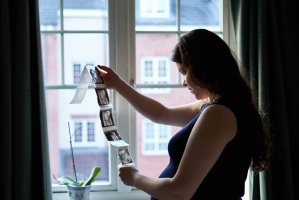Get ready for the most significant abortion decision in 50 years

On Monday, the United States Supreme Court agreed to hear Dobbs v. Jackson Women’s Health. At least four justices needed to agree to accept the case and it is likely that they would not have done so if they did not believe they could get one or more of the remaining justices to join them in a decision.
Generally, the Court likes wiggle-room, but this case does not give them much room. The Court specifically agreed to address the question of whether states can protect the life of the unborn child prior to viability. No more slowly chipping away at Roe v. Wade (1973).
But amid my excitement at the Court’s announcement, I was hit with a feeling of dread. I have been here before. I had the same initial sense of hope when the Court agreed to hear Planned Parenthood v. Casey (1992). Abortion cases seemed to be moving in the right direction. But the Casey result was deeply disappointing. It altered the Roe framework a bit, but continued to prohibit states from protecting unborn children in the vast majority of cases.
There are many reasons to celebrate the potential reversal of Roe and Casey. God created humans in His image (Gen. 1:26-27). He forms them in their mothers’ wombs; they are “fearfully and wonderfully made.” (Ps. 139:3). God calls on the Hebrew people to “choose life.” (Deut.30:19). Moreover, Roe and Casey are contrary to American law — they violate the Amendment to the Constitution on which they are based.
Below, I point to some of the troubling language in Roe and Casey.
The Court’s standard for meaningful life
Roe held unconstitutional all laws prohibiting abortion prior to “viability” — the time when the child is able to live outside of the mother’s womb. The Court stated:
“With respect to the State’s important and legitimate interest in potential life, the ‘compelling’ point is at viability. This is so because the fetus presumably has the capability of meaningful life outside the mother’s womb. State regulation protective of fetal life after viability thus has both logical and biological justification.” (410 U.S. 163, emphases added).
The Court’s reasoning appears to be:
- Only those who are capable of meaningful life are protected by the Constitution.
- Prior to viability, the child is not capable of meaningful life.
- Therefore, the unborn child is not entitled to state protection.
Under this reasoning, one who is dependent on other people is not entitled to the law’s protection. I love independence, but it should not be the defining characteristic of meaningful human life. Everyone goes through periods of dependence — for most people, childhood, illness, and old age. An automobile accident can leave us dependent on others for life. Roe suggests that during periods of dependence, we have no legal right to protection. This is exactly the opposite of the Jewish and Christian teaching that those who are dependent (the widow, the orphan, the outsider) are entitled to care. All human life, even dependent human life, is meaningful.
A blow to democracy
In 1965 abortion was illegal in every state in America unless the mother's life was at risk. By 1973, the year Roe was decided, some states had broadened the circumstances under which abortion was permitted. The important issues raised by abortion — when does life begin? Should the law regulate this area? How should the interests of the mother and child be balanced? — were subjects of public moral discourse. But Roe removed them from the democratic process. The Court seized an issue over which they have no expertise and no authority. Roe and Casey have distorted both our constitutional jurisprudence and our political processes for almost 50 years.
If the abortion issue involved a complicated legal issue, that might provide one argument for judges, rather than ordinary people, to resolve it. But legal training does not give judges any special ability to determine when life begins, whether it has value, or how the interests of mothers and unborn children should be balanced. The Court withdrew this issue from the political arena, where citizens could thrash through the issues and resolve them.
The Court’s abortion jurisprudence has troubling implications for democracy and the rule of law. As Mary Ann Glendon has said:
"[When judges remove decisions from the democratic arena, they undercut] the normal processes through which citizens build coalitions, develop consensus, hammer out compromises, try out new ideas, learn from mistakes, and try again* * * Political skills atrophy. Men and women cease to take citizenship seriously. Citizens with diverse points of view lose the habit of cooperating to set conditions under which all can flourish. Tolerance suffers as communication declines."
When judges openly seize power on a questionable legal basis, the rule of law and respect for law is weakened. When judges become a law unto themselves, we should not be surprised when citizens also ignore the law.
'Substantive due process'
Moreover, the Court removed the issue of abortion from the democratic process through deceptive, demeaning, elitist means. Roe and Casey held that states may not prohibit abortion based on the Due Process clause of the Fourteenth Amendment which prohibits states from depriving citizens of “life, liberty, or property, without due process of law.” By its terms, this clause only protects the citizens’ right to due process (i.e., procedures like notice of charges and trial by an impartial decision-maker). Casey identified no procedural irregularity in the states’ prohibition of abortion, but holds that the right to abortion is a matter of “substantive due process.” This is doublespeak. The Court uses a provision requiring procedural protections to give itself unlimited powers to regulate substance.
At one point, the Casey court condescendingly claims that “some of the Constitution’s language is hard to fathom . . . .” But the language of the Constitution is not the problem. It does not take a linguistic expert to see that talk of “substantive due process” is just a cover for the Court’s seizure of power never granted to it by the Constitution.
The Court’s view of pro-life advocacy
The Court calls efforts to overturn Roe “mere unprincipled emotional reactions” and claims for the Court “the authority to . . . speak before all others for [the people’s] constitutional ideal.” It calls on the contending sides to accept its “mandate.” (505 U.S. 866-67) But the Constitution does not give the Supreme Court the authority to issue any mandate it chooses. In Roe and Casey, the Court ignores the rule of law and asserts its right to rule.
'The mystery of human life'
In the course of the Casey opinion the Court revealed its underlying philosophy: “At the heart of liberty is the right to define one’s own concept of existence, of the meaning of the universe, and of the mystery of human life.” (505 U.S. at 851) If the Court took seriously the “mystery of human life” passage, if everyone has a right to define his or her own existence, it would impose a lawless regime on the United States. It would remove any basis for law or social responsibility.
In the mystery passage, the Casey opinion imposes on the American people a religious view of life. Many, if not most, Americans believe that God reveals to us the meaning of life — we discover it, we do not create it. The Court puts the human in the place of God, and abortion is a striking example of where humans can go when they see themselves as gods.
Under Casey, defining one’s own concept of the mystery of human life includes the right to take another human life. The Court’s doctrine of self-creation is not only troubling, it contrasts dramatically with America’s founding traditions. The Declaration of Independence claims for us a right to liberty, but we were “endowed by [our] creator” with liberty. We do not create it. Liberty is part of the givenness to life, part of an objective moral order. We have rights because they were given to us; we don’t just make them up. And “liberty” is not the only God-given right.
Among the God-given rights celebrated in the Declaration is the right to “life.” The rights to “liberty and the pursuit of happiness” should not trump the right to life, which rightly comes first in the Declaration. One should not be able to “define one’s own concept of existence” (in Casey’s words) at the expense of the life of another human being.
Precedent
We will hear a lot about precedent in the coming months (from a lot of people who don’t generally care much about precedent). The Court does not like to reverse itself. There is value in law being consistent. People can rely on it and plan their lives around it. But the Court has been clear throughout its history that it will reject precedent when it has made a serious error. As Justice O’Connor said:
Although we must be mindful of the "desirability of continuity of decision in constitutional questions. . . . when convinced of former error, this Court has never felt constrained to follow precedent. In constitutional questions, when correction depends on amendment and not upon legislative action this Court throughout its history has freely exercised its power to reexamine the basis of its constitutional decisions."
Casey itself overruled the trimester precedent of Roe and set up its own framework for a right to abortion.
Conclusion: An important precedent for reversing precedent
The importance of reversal of precedent is illustrated by a case that was decided, as I write, exactly 125 years ago, Plessy v. Ferguson (1896). In Plessy, the Court held that the Equal Protection clause of the Fourteenth Amendment permitted racial segregation so long as facilities are equal. The only redeeming fact of the case is that it was the occasion for what many believe to be the best Supreme Court opinion in history — the dissent of Justice John Marshall Harlan.
Justice Harlan and his opinion are celebrated as I write in a wonderful article in The New York Times. The Times fails to note that Justice Harlan was an evangelical Christian. He taught an adult Bible class for 15 years at his Presbyterian Church. His fellow evangelical and fellow Justice David Josiah Brewer said of Harlan that he “goes to bed every night with one hand on the Constitution and the other hand on the Bible.”
Both the Constitution and the Bible pointed Harlan in the same direction. In his Plessy dissent, Harlan wrote: “Our constitution is color-blind, and neither knows nor tolerates classes among citizens. In respect of civil rights, all citizens are equal before the law. The humblest is the peer of the most powerful.”
Thankfully, 60 years later in Brown v. Board of Education (1954), the Supreme Court followed Justice Harlan and reversed the well-established Plessy precedent. The Court exercised a bit of humility — a rare commodity in legal circles — and admitted that it had been wrong. It held that black students have a right to attend the same schools as white students. Hopefully, the current Supreme Court will be willing to admit that it erred 50 years ago and that states can protect the life of unborn children. My hope and prayer is that Dobbs v. Jackson Women’s Health will be the Brown v. Board of Education of this century.
Robert F. Cochran, Jr. is the Louis Brandeis Professor Emeritus at Pepperdine University School of Law. He has published over 60 articles and 10 books, including Christian Perspectives on Legal Thought (Yale University Press) and Law and the Bible (InterVarsity Press, 2013) (with David VanDrunen) and Agape, Justice, and Law (Cambridge University Press (with Zachary Calo).



























